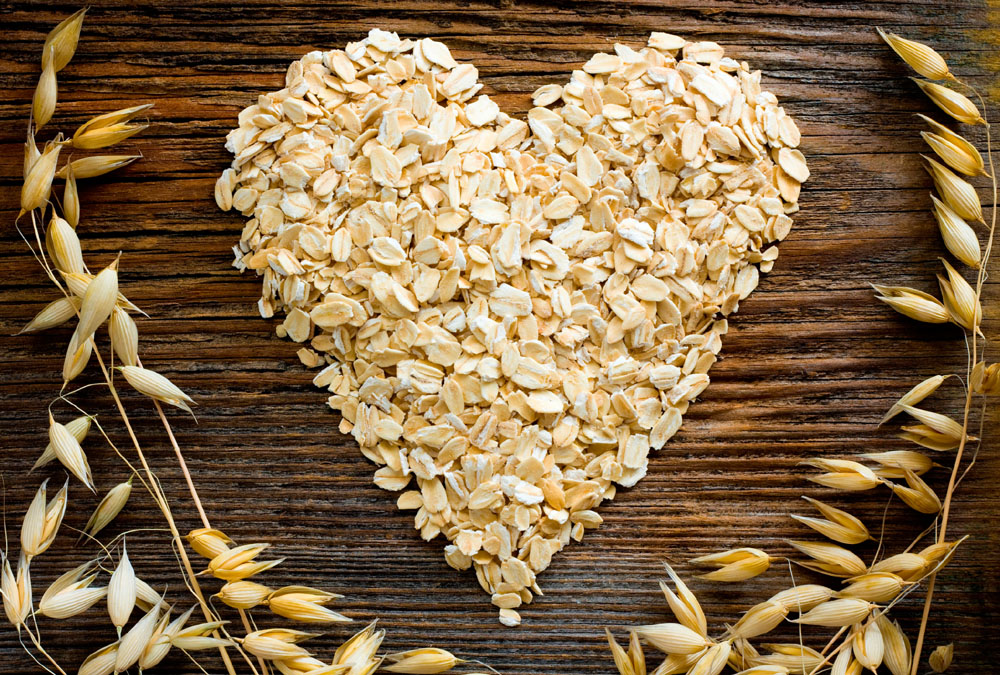
Oats are one of the healthiest food grains out there. Also known by the scientific name Avena sativa, oat is commonly consumed as a breakfast cereal and is particularly recommended for those with high cholesterol or high blood pressure and blood sugar. Besides being rich in complex carbohydrates and fibre, oats are also rich in a range of nutrients. Oats are available in a variety of forms, depending on the level of processing that the product has undergone. They are consumed for their numerous health benefits with the least processed forms having low glycaemic indices. However, despite all its benefits, oat may not be the cereal of choice for many around the world, due to its neutral taste and mushy texture when cooked as oatmeal.
Oat Nutrition: Facts And Nutritional Values
Groats (unprocessed whole oats) and steel-cut oats are among the least processed forms of oats. These take longer to digest and to cook as well. There are other more processed forms like instant or rolled oats, which are more popular as these are easier to cook with. According to the data by United States Department of Agriculture, a 100 gram portion of oats contains 4 grams of beta-glucan, which is a soluble fibre credited with improving satiety by slowing down digestion. The same portion supplies 389 calories, with 11 grams of dietary fibre, 16.9 grams of protein and good amounts of a range of micro-nutrients, including calcium, magnesium, manganese, phosphorus and potassium.
Health Benefits Of Oats
1. Consumption of oats and other whole grains has been linked with lower risk of cardiovascular diseases as they help reduce levels of cholesterol in blood.
2. The beta-glucan present in oats regulates levels of blood sugar and insulin, by slowing down the process of digestion, and hence, it may prove to be beneficial for diabetics or for slowing advance of diabetes.
3. Oats are also said to aid weight loss by increasing satiety. This is due to the presence of soluble fibre, which binds with water and increases in volume in the gut.
4. Oats have also been credited with improving gut health by increasing gut microbiota, which happens when the soluble fibre breaks down in the gut.
Creative Ways Of Including Oats In Your Weight Loss Diet
1. Oat Smoothies
Adding oats to your morning fruit smoothies is a sure-shot way of making your breakfast fibre-rich and filling. All you have to do is blitz roll oats and then blend them with the yogurt, fruit and milk mixture to get delicious and filling oat breakfast smoothies.
2. Oat Bread
Ground oats can also be added to bread batter for healthy and nutritious oat bread. You can mix in some bananas and make sweet oat bread for a healthy tea-time snack. Here's a recipe for banana oat bread that you'll like.
3. Oat Granola/Snacks
Oats are commonly toasted along with a variety of nuts and then flavoured with honey, cinnamon, nutmeg among other things to make healthy, lose granola or granola bars for a high-fibre on-the-go snack. Here's a recipe for sugar-free oats that you'll want to try.
4. Oats Pancakes, Dosas, Uttapams And More
You can add rolled oats to batters of a number of flat-cakes, both Indian and otherwise. It's a simple way of adding some much-needed soluble fibre to pancakes, dosas, uttapams and more. Here's a recipe of cinnamon oatmeal pancakes that you can try out.
5. Homemade Oats Pizza
You can even make the crust of your homemade pizzas from oats! That's the most fun way of sneaking in the fibre in your meals. Not just that, you can even cook oats in the form of risottos, which would basically be savoury oatmeal with sautéed vegetables cooked in the style of this Italian favourite.
Once you get yourself to experiment with this superfood, sky is the limit. Which of the above-mentioned oat dishes are you preparing soon? Let us know in the comments section below! You may even experiment with other healthy ingredients of your choice.

Tea is one of the most popular beverages the world over. The concoction is enjoyed in numerous different ways in different parts of the world. The caffeinated beverage also has many different types, depending on the climate that it's manufactured in, the level of processing that the leaves are made to undergo, the season that the leaves are harvested in etc. Nowadays, caffeine-free herbal teas or tisanes have also gained popularity, especially among those who have been addicted to caffeine and who need to cut it down. Herbal teas are typically concoctions prepared by boiling a number of spices, herbs or other parts of the plant, like flowers, with water.
Fruit-infused teas have also gained popularity. These beverages cannot be categorised as 'teas' technically as they don't contain tea leaves, but are instead prepared by boiling an assortment of dried or fresh fruits in water, along with spices. Fruit-infused teas may contain some water soluble vitamins and nutrients that may get seeped into the water that the fruits are being boiled in. Although such fruit-infused teas may actually have limited health benefits, they serve as great alternatives for caffeinated teas. They are delicious as they contain the delicate flavours of the fruits and you can drink these anytime of the day including late into the night, without worrying about staying awake.
How To Make Fruit-Infused Tea
We have the perfect recipe for a fruit-infused tea that is suited for hot summer days. The infusion is completely free of caffeine and contains the relaxing chamomile tea that is known to have a number of health benefits. Here are just some of them:
1. May help fight insomnia and help improve the quality of sleep.
2. May fight digestive issues like diarrhoea and stomach ulcers.
3. May boost heart health, due to the presence of flavones that have antioxidant properties.
4. May help soothe anxiety.
The recipe also contains the calming and soothing earthy flavour of ginger. This recipe uses a variety of Vitamin C-rich fruits like oranges, berries, along with chamomile tea, mint leaves and ginger. It's very easy to make the tea and all you have to do is wash all your ingredients thoroughly and then boil them in water and then pour the filtered water out into cups. You may add honey as per your taste.
Veganism is gaining steam all around the world, against the backdrop of growing health concerns against processed foods and their repercussions on health. The added chorus against climate change and the impact of animal rearing on the environment may also be a contributing factor in the rise of popularity of veganism and vegan food. Food allergies, religious convictions and specific health reasons may also prompt people to go the vegan way. Veganism is a diet that shuns meat and meat products, dairy and dairy products, as well as all refined and processed foods, in the favour of more natural, plant-based and organic food products. Vegans consume foods that are mainly derived from plants and are free of animal products. But if you are someone who has been planning to go vegan or has to make the switch for health reasons immediately, you may want to be ready for some common hassles.
A lot of people may find that adapting to a vegan lifestyle isn't very easy, not the least because vegan foods and food products are expensive. Veganism also requires a whole lot of planning and prepping, as well as some research. This is because vegan products, especially those that guarantee quality, may not be very widely available. Take sweeteners, for example. Vegans may not have a lot of options available when it comes to sweetening their foods and beverages, but there are some natural alternatives to refined sugar that vegans may choose from.
Healthy Vegan Diet: Best Vegan Sweeteners
1. Dates or date syrup
One of the best sweeteners that vegans can use in their desserts and dishes is the date syrup. Although it's not technically syrup, this is made by simply grinding de-seeded dates in lukewarm water. Dates are rich in dietary fibre, as well as minerals like calcium, magnesium and potassium. Date syrup can be added to all your desserts for a sweet taste and it makes for the safest, most nutritious vegan sweetener, as it is made at home from a dried fruit.
2. Maple Syrup
This natural sweetener is derived from the sap of the maple tree and most of the world's maple syrup comes from Quebec in Canada. Depending on when the sap is harvested, the colour of the maple syrup may vary and the products are categorised as per their colour. Maple syrup is said to be healthier than refined sugar due to the presence of antioxidants and minerals present in it. Maple syrup is extremely rich in manganese and it also contains some amounts of potassium, calcium, zinc and iron.
3. Coconut Sugar
It is touted to be lower on the glycemic index as compared to regular sugar and may be a good natural alternative to refined sugars. Coconut sugar is derived from the coconut palm tree, by collecting the liquid sap inside the coconut flower. The sap is subjected to heat until all the water is evaporated. Coconut sugar is said to even retain some of the nutrients of coconut palm, most notably, potassium, calcium, zinc and iron.
4. Brown Rice Syrup
This sweetener made from brown rice is prepared by breaking down starch present in the grains, which results in easily digestible sugars. Brown rice syrup may be considered better than normal sugars, due to the absence of fructose.
Vegans must consult their nutritionist or a certified dietitian about which sweetener is the best for them, or for their particular health condition and then make the right pick.
In order to maintain a healthy lifestyle, it is imperative to load up on foods that are rich in vital nutrients. While taking care of our body, we often tend to neglect our nails. There is no denying the fact that our nails can reflect our inner health to a great extent. In order to keep them healthy and strong, it is important to look after them. If you've been suffering from the problem of unhealthy, discoloured or chipped nails, then including a few foods in your daily diet might come to great help. Calcium and B vitamins are essential for healthy nails. Here is a list of 5 foods that may help you get stronger nails.
Fish
To attain healthy and stronger nails, it is important to load up on proteins. A diet rich in protein can prove to be beneficial for one's overall health. Rich in omega-3 fatty acids, fish is an excellent source of proteins and sulphur. If you happen to have thin and brittle nails, then this one's for you. Since fish has abundant amounts of omega-3 fatty acids, it will help in moisturising the nail bed. Apart from this, it can also increase their suppleness.
Eggs
A whole, large egg can provide you with a good dose of vitamin D. Not only is it a great source of protein, but its vitamin B12, iron and biotin content are known to increase fingernail thickness. Include this healthy food in your daily diet and watch out for results.
Green Peas
These tiny delights look small but are packed with a host of health benefiting properties. Green peas are abundantly rich in protein, beta-carotene and vitamin C. This nutrient-rich food helps in strengthening the finger nail and may increase its rate of growth as well.
Oats
For healthy fingernail maintenance, it is imperative to load up on micronutrients as well. Oats are rich in copper, zinc, manganese and B vitamins, which are known to promote healthy fingernail growth.
Green Leafy Vegetables
Loaded with calcium, iron and antioxidants, green leafy vegetables are a powerhouse of nutrients. Adding spinach, kale, broccoli etc. to your daily diet may help you keep brittle nails at bay.
So, if you've successfully given up on the habit of biting your nails and are now on the next step of making them strong and healthy, bring these foods to your rescue and get going!

A lot of people nowadays go on diets, often times not being able to follow them for a long time. A lot of diets are difficult to follow and tend to be unsustainable for long term. This results in a fluctuation in our diet, diet plans and weight. These frequent ups and downs in your dietary habits is known as yo-yo dieting, a phenomenon that has been discussed a lot by health experts nowadays, but about which a lot of people still remain woefully unaware. It's also known as weight cycling and it describes a pattern of eating that leads to loss of weight for the short time period when the diet is followed and then regaining of weight, when the dieter inadvertently stops following a particular diet for a long period of time.
Although wanting to clean up your meals and going on a diet for the general betterment of your body is considered a good idea, you need to be cautious of falling into the yo-yo dieting pattern. A number of research studies have looked into the impact of the yo-yo dieting on the body and the results have been unanimous in suggesting that we are better off sticking to our respective healthy diets, rather than abandoning them mid-way.
Here are some purported harmful effects of yo-yo dieting on your health:
1. Increased risk of heart diseases
A University of Columbia study said that yo-yo dieting may increase risk of heart diseases in women who lost some 10 pounds after following a diet and then regained the weight within the same year. The researchers said that it was difficult in these female participants to control heart disease risk factors. Weight cycling is also said to be linked with an increased risk of coronary heart disease.
2. Prevents you from reaching weight loss goals
Yo-yo dieting builds a frustrating pattern of weight gain after an encouraging spells of weight loss. This frustration may prevent you from reaching your long term goal of weight loss. Yo-yo dieting essentially involves giving up on the diet once you see sufficient weight loss, which leads to weight gain once again. Your body is not able to maintain a healthy weight or keep your weight off.
3. Increase in body fat percentage
Weight cycling has been linked with an overall increase in body fat percentage, belly fat, as well as increased risk of obesity. Weight Cycling or yo-yo dieting may also increase risk of future weight gain, as per some studies conducted on the impact of this diet on the body. It was, however, found that yo-yo dieting did not increase risk of Type-2 diabetes or high blood sugar levels.
Although there is still more research required to conclusively prove whether yo-yo dieting is definitively bad for the body, the weight cycling pattern can be certainly frustrating for anyone looking at losing weight for good. Yo-yo dieting or Weight Cycling takes place when a dieter follows a fad diet that promises quick weight loss and limited overall health benefits. This is why the effects of these diets last for a short period of time and are easily reversed in the form of weight gain.
Here are some tips to prevent yo-yo dieting pattern or weight cycling and achieve weight loss for the longer term:
1. Eat healthy well-balanced meals and don't starve yourself.
2. Avoid eating out more than two times a week. Compensate for a meal at the restaurant, by cutting down on calories for the rest of the day.
3. Avoid sugary drinks and packaged fruit juices, as well as drinks with artificial sweeteners in them.
4. Set realistic weight loss goals and follow your diet patiently and with discipline.
Also Read: Dopamine Diet For Weight Loss: A Diet That Promises To Make You Happy While Shedding Kilos!
5. Indulge yourselves once in a while in your favourite foods, but make sure you only do that after completing your stipulated hours or workout for the week.
6. Avoid eating too late in the evening or late at night. Eating right before bed can also lead to weight gain.
It's important to make sure you have the right intention for following a healthy diet. Instead of achieving quick weight loss and merely doing it to look good, concentrate on eating healthy for a fit body and healthy mind.










